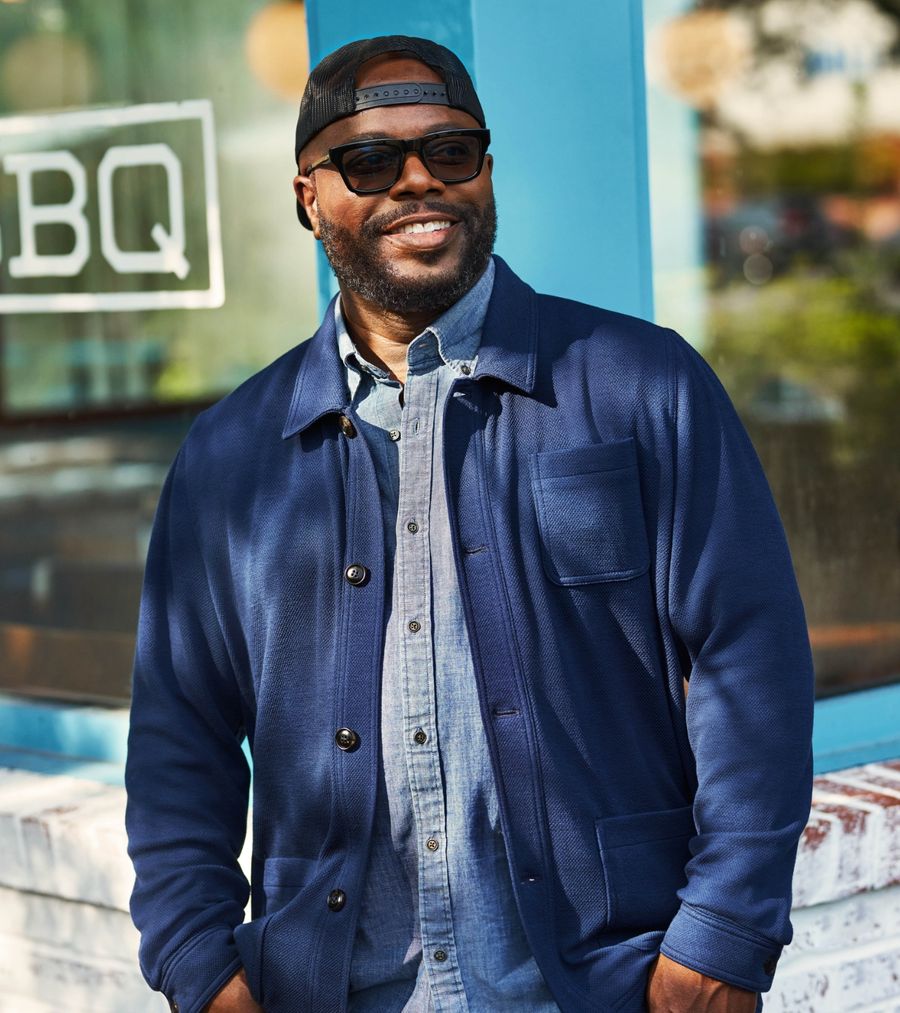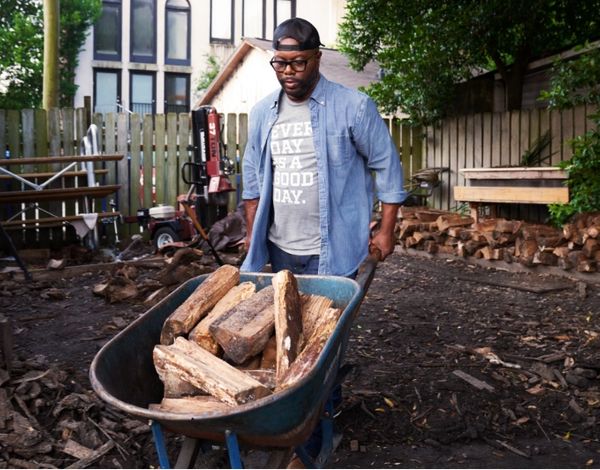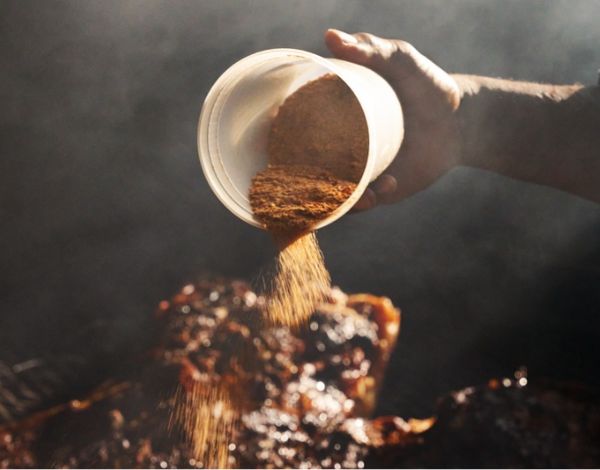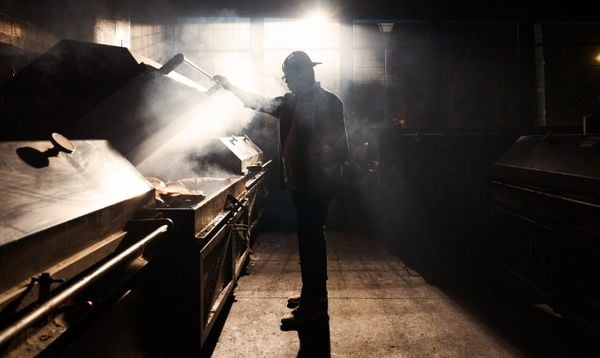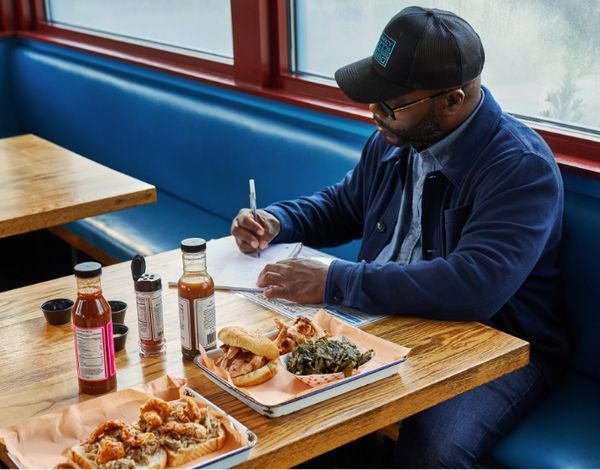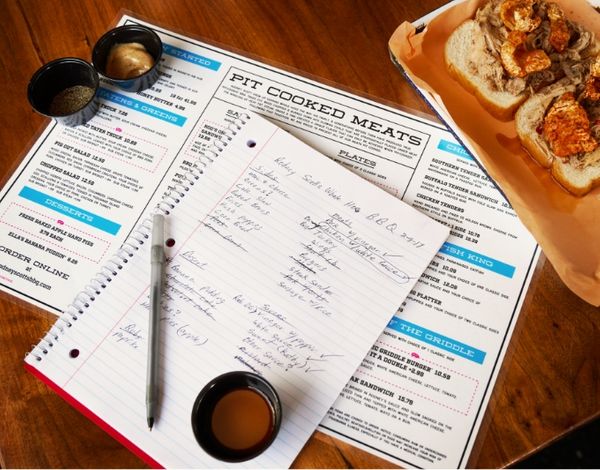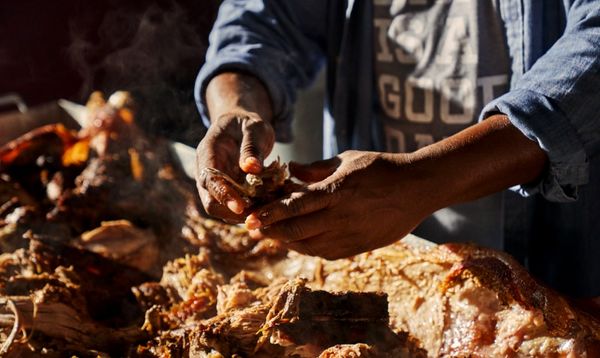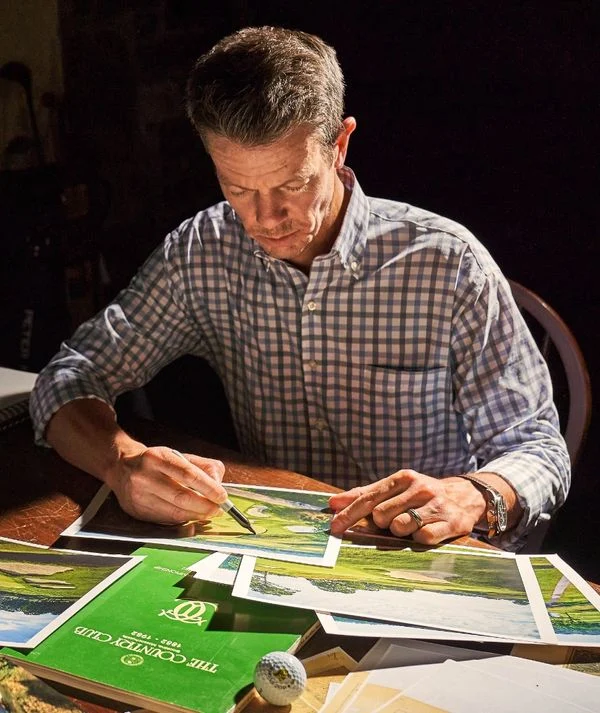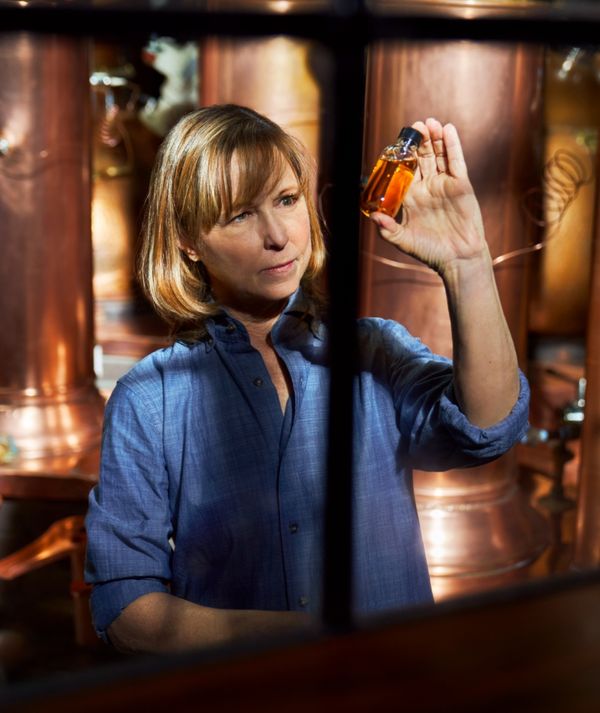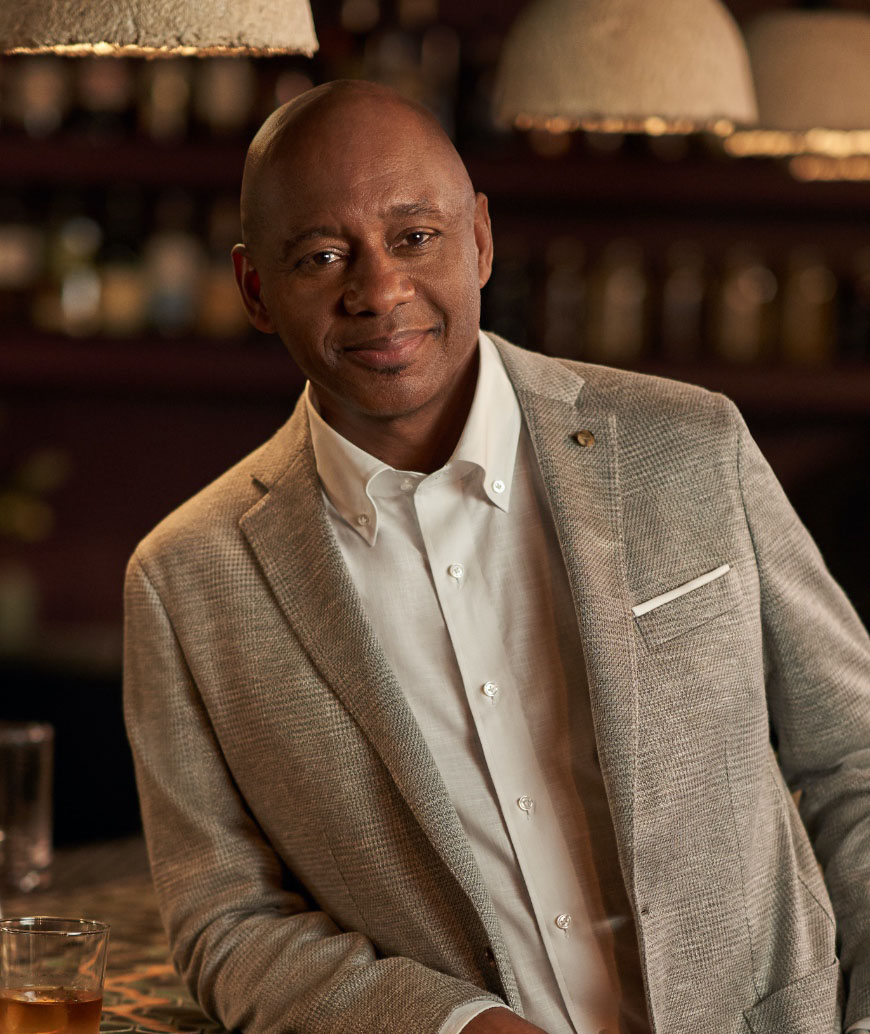Rodney
Scott
James Beard Award-Winning Pitmaster
A bout an hour west of Myrtle Beach, right off the quiet of two-lane Highway 51, sits Scott’s Barbecue, a South Carolina institution for pit-cooked, wood-fired, whole-hog barbecue for nearly 40 years.
It’s a busy place, where folks from all corners of the small town of Hemingway come to catch up, check in and share some food. A feature in The New York Times written by John T. Edge of the Southern Foodways Alliance back in 2011 took it from local treasure to must-visit destination, despite its remote location.
The man who led its continued transformation in the years that followed, Pitmaster Rodney Scott, has now become a household name in barbecue circles across the world. From humble beginnings sometimes come big things.
Growing up, Rodney always knew hard work. It was a birthright. Some of his earliest memories were in helping out around the store and the farm—sweeping floors, picking produce, mowing the lawn. And cooking hogs first started as a chore too. He liked it a whole lot better than most other things, and eventually devoted his life to the calling, even if he admits he was reluctant to embrace it as a young man.
Rodney is no longer involved in the business in Hemingway, even if his pictures are still scattered across the walls there. He packed up his life and headed south to Charleston in 2017 to open his own place.
He’s open about his family struggles, but he’s better at telling those stories himself, and he does in his book, “Rodney Scott’s World of BBQ,” which was published earlier this year.
Part memoir, part cookbook, it paints a poignant picture of his life, his family and his food. Raised around culinary traditions that were largely passed down orally, the book gave him the chance to get all of his knowledge down somewhere permanent.
“You have to use every sense that you have in the pit: listening, smelling,
seeing and touching.”
“People would tell you what was done,” he says. “They would give you ideas, hints, pinches, drops of recipes. To put all of these things on paper was a challenge, but also a relief. Now that it’s where so many other people can learn from it and understand it, I feel like we’re leaving something here in this world.”
The more he shares of himself, the bigger that world seems to get for Rodney.
—
Pulling up to his Charleston restaurant early in the morning, the smell hits you even before you open your car door in the parking lot across the street. Rodney says he can pick up the scent more than a mile away. That smoky perfume is a calling card for good barbecue—pitmaster advertising at its finest.
The windows are draped in a thick layer of morning dew. As the city begins to stir, car lights from King Street flicker through the live oaks, dancing off the disco ball hung on the ceiling, the centerpiece of the dining room.
In the pit, there’s a different dance going on. Team members are hard at work around the series of mobile cookers. Pigs, ribs and chickens are being sauced, and flipped. It’s a big catering day, and 300 sandwiches and sides have to be prepped and packed before the restaurant opens at 11. It’s all hands on deck.
The secret ingredient to all this magic happening while the smoke’s swirling around? Music. Often it’s out loud, a playlist from Rodney’s old-school iPod turning out some Anthony Hamilton or LL Cool J over a portable speaker. Often, though, it’s just happening in Rodney’s head. You can tell when he’s diving into something and he just starts nodding. There’s probably something good bumping through the brain waves. It’s been his comfort and his muse since he was a kid.
Rodney now co-owns and operates three different locations —Charleston, Birmingham, and, most recently, Atlanta—so he’s not burning the midnight oil as much as he did for so many years. He has trusted teams in place who are putting his barbecue wisdom into action. Even still, as soon as the pig is ready for its final stages, he jolts right into gear.
“You have to use every sense that you have in the pit: listening, smelling, seeing and touching,” he says. “Listening to the fat dripping in the coals. Smelling to see what stage of the cook the hog is in, or the ribs or chicken. Watching how fast the smoke comes out. Seeing is believing, but touching is proof. So I touch—I trust my sense of touch more than I do the temperature on the thermometer.”
Once the pig is flipped, he starts hitting it with the sauce mop. The juices scatter and pool in the pig’s cavity. A quick helping of spice is applied, and then, with a large metal spoon, he begins breaking up the meat to make sure the flavors are evenly distributed. Steam from the piping hot pig drifts towards the ceiling, and Rodney jumps in without hesitation with his bare hands, which still bear the hard-earned callouses of a seasoned pitmaster.
Twisting, tearing, smelling and tasting, he pulls out bones and separates the meat to get it ready to be served.
—
So much has been written about what makes Rodney Scott’s food special. And it is. Intoxicatingly so. It’s why he won a James Beard award for Best Chef: Southeast in 2018. His craft has been studied to perfection throughout the majority of his life, and as much as the award was a surprise to him personally, it was a deserved accolade for decades of tireless dedication.
His standards are high, even outside the pit. When he discovers that his team have altered the ratios in his sweet tea, he steps in to correct them. He’s adamant that it’s supposed to come off really sweet upfront, because, once the ice melts, it will be just right. Around these parts, that melting doesn’t take very long.
His methods for cooking whole hog are both intuitive and imperfect. It’s inherent to cooking with wood, and it’s part of the appeal; every pig comes off a little bit different. If you want the finer details, and even learn how to do it yourself, step by step, it’s all in the book. He’ll tell you what makes good wood, and a sound pit, even give you the recipes for his sauces. That takes a lot of confidence.
“Usually barbecue guys hide their recipes for their sauces or techniques,” he says. “I wrote my recipes in my cookbook and explained everything to the world. It’s like, ‘I can give you the tools, but will you use them?’ Maybe, maybe not. I just felt like it was a chance to share what I do.”
That confidence is part of who Rodney is, too. He’s earned it. He lives it.
“I try to deliver confidence in my smile, my energy, and my whole body language,” he says. “That confidence came from doubting myself as a teenager. That confidence came from other people doubting me as a young man. I felt that if I held my head high and carried respect, everything would be fine.”
Quick-witted, with a deadpan delivery, Rodney exemplifies purpose, care and precision. That obviously manifests itself in the food at his restaurants, but it flows through his method of transportation (a kitted-out red GMC Denali these days) and his personal style, which he’s wanted to keep sharp even when he was thrifting his suits.
Living his life with such purpose does not mean he is closed off from the world around him. Quite the opposite. Unsurprisingly for a guy who is used to spending 12 hours cooking a pig, he exudes patience. He listens intently, speaks with a spark and is generous with his attention. When you’re around him, he just makes you feel special.
And he runs with a motor that we all wish we had. After meeting us at the restaurant at 5 a.m., he’s still giving us the full Rodney Scott experience by 6:30 p.m. We’re bleary-eyed; he still has plenty of stories left to tell, like the time he cooked the best hog of his life in the Mississippi Delta with Nicholas Pihakis, the son of his best friend and business partner, Nick.
“The tornadoes hit that night, two miles down the road,” he says. “The pit got flooded. The area was dark and considered to be haunted. Supposedly, this was where someone made a deal with the devil. You could not see your hand in front of your face. We started cooking with floating trash can lids in the flooded pit.
“I have no idea if it was the water, the spirits that surrounded it, if it was the technique of the floating trash can lids, or if it was the air that was brought in by the tornado. I’ve cooked a lot of hogs—there’s not one single hog that can match the flavor that came off of that hog we cooked down in the Delta.”
And he’s not going to stop until he’s shown as many people as possible what barbecue can do for the world.
Because that’s the thing for Rodney. It’s not so much what barbecue is that makes it so important. It’s what it does. Bring people together. Get people talking. Feed them in a way that goes beyond filling their bellies. And start a party.
It’s all part of what he likes to call “barbecue hospitality.”
“It comes from extending your soul through that food, that 12-hour cook time, and delivering it with a smile and so much love and passion to your guests who are just there to enjoy,” he says. “What took you 12 hours is going to take them just a few minutes to love and never forget.”
If a young Rodney Scott growing up in Hemingway could have envisioned what’s become of his life and career, and the places it’s taken him, he probably wouldn’t have believed you. But you better believe he’s enjoying it now.
“I always say to myself, ‘If this is a dream, don’t wake me,’ “he says. “I don’t think there are words to explain the joy that I feel and experience from day to day. You cannot tell me that the world is not my playground.”
Play on, Rodney Scott. Keep spreading the light. We’re ready for that next party.
“I felt that if I held my head high and carried respect, everything would be fine.”
